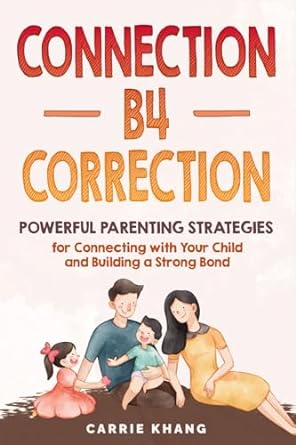Positive Parenting | Insider Tips for a Healthy Family

Dive into the world of positive parenting with our exclusive insider tips. Transform your family dynamics for the better and create a haven of happiness and well-being.
Positive parenting is a philosophy that focuses on respectful relationships, clear expectations, and teaching children through love and guidance. It involves nurturing and supporting children’s emotional well-being while also setting boundaries and providing consistent consequences.
By practicing positive parenting, parents can help their children develop confidence, independence, and a sense of self-worth. This approach emphasizes the importance of expressing love, kindness, and value to children, sending the message that they are loved, good, and matter.
Positive parenting is a powerful way to create a nurturing and fulfilling parenting experience, benefiting both children and parents alike.
Understanding Positive Parenting
Positive parenting is an approach to raising children that focuses on nurturing a child’s social, emotional, and mental well-being. It is rooted in mutual respect, empathy, and clear communication between parents and their children. The core philosophy of positive parenting is to foster a healthy parent-child relationship, encouraging positive behavior and emotional development. Rather than relying on punitive measures, positive parenting emphasizes guidance, encouragement, and setting age-appropriate expectations.
Key principles of positive parenting include:
- Connection: Building a strong emotional bond with your child is fundamental. Positive parenting encourages parents to be actively present, offering emotional support and understanding.
- Communication: Open and honest communication is key. Positive parenting involves actively listening to your child, expressing yourself clearly, and fostering a dialogue that promotes trust and understanding.
- Empathy: Understanding and acknowledging your child’s feelings is crucial. Positive parenting encourages parents to put themselves in their child’s shoes, promoting empathy and emotional intelligence.
- Setting Limits: While positive parenting focuses on positive reinforcement, it also involves setting clear and consistent limits. This helps children understand boundaries and expectations.
- Encouragement: Acknowledging and praising your child’s efforts and achievements fosters a positive self-image. Positive parenting involves providing constructive feedback and encouragement.
- Problem-Solving: Instead of resorting to punishment, positive parenting encourages collaborative problem-solving. It teaches children how to navigate challenges and make positive choices.
- Modeling Behavior: Children often learn by observing their parents. Positive parenting involves modeling the behavior and values you wish to instill in your child.
- Respect: Treating your child with respect is fundamental to positive parenting. This involves recognizing their autonomy, opinions, and individuality.
What is positive parenting?
Positive parenting is a parenting and disciplinary philosophy that emphasizes mutual respect and positive instructions. It involves showing children love, warmth, and kindness while guiding them to act in desirable ways through encouragement and teaching. By practicing positive parenting, you are sending a powerful message to your child: You are loved, you are good, and you matter.
The Importance Of Positive Instructions And Mutual Respect
Positive parenting revolves around fostering respectful relationships built on clear expectations. It emphasizes using positive instructions instead of negative ones. Instead of saying, “Don’t jump on the couch,” a positive instruction would be, “Please keep your feet on the floor.” By using positive instructions, you redirect your child’s behavior in a constructive manner while reinforcing their understanding of appropriate actions.

Photo: Amazon
Mutual respect is another cornerstone of positive parenting. It involves treating your child with kindness and empathy, recognizing their individuality, and valuing their thoughts and feelings. By showing mutual respect, you create an environment where your child feels safe, understood, and valued. This sets the foundation for a healthy parent-child relationship.
Building A Strong Connection With Your Child
One of the fundamental goals of constructive parenting is to build a strong connection with your child. This connection forms the basis for effective communication, trust, and emotional bonding. When you have a secure attachment to your child, they are more likely to listen to your guidance and accept your discipline.

Photo: Amazon
To build a strong connection, it’s important to spend quality time with your child, engage in activities they enjoy, and actively listen to their thoughts and concerns. Show genuine interest in their lives and create opportunities for open and honest conversations. By doing so, you foster a sense of belonging and strengthen the parent-child bond.
The Benefits Of Positive Parenting
Positive parenting is not just a parenting philosophy but a way of life that can have numerous benefits for both parents and children. By emphasising mutual respect and positive instructions, positive parenting fosters a healthy and nurturing environment that promotes the overall growth and development of children. Let’s explore some of the key benefits of positive parenting.
Promoting Healthy Growth And Development
Positive parenting plays a crucial role in promoting healthy growth and development in children. When parents adopt a positive approach, they create an environment that allows children to feel loved, supported, and valued. This nurturing environment helps children develop a positive self-image, strengthens their emotional well-being, and builds their resilience to face challenges. By providing consistent guidance and setting clear expectations, positive parenting sets the foundation for children to become confident and well-adjusted individuals.

Photo: Amazon
Fostering Confident And Successful Kids
One of the primary benefits of positive parenting is its ability to foster confident and successful kids. By focusing on building respectful relationships with their children, positive parents create a strong bond based on trust and open communication. This connection enables children to develop a positive sense of self and promotes healthy social interactions. When kids feel supported and loved, they are more likely to take risks, explore their interests, and develop the necessary skills to navigate the challenges of life. Positive parenting sets children up for success by instilling in them a strong belief in their abilities and providing them with the necessary tools to thrive.
Creating A Loving And Supportive Environment
Creating a loving and supportive environment is a cornerstone of positive parenting. Positive parents prioritise building a strong emotional connection with their children and focus on creating a home filled with warmth, kindness, and understanding. This environment allows children to feel safe and secure, which is essential for their overall emotional well-being. By being sensitive, responsive, and available to their kids’ needs, positive parents foster an atmosphere of love and support that strengthens the parent-child relationship and promotes healthy development.
In conclusion, positive parenting offers a multitude of benefits for both parents and children. By promoting healthy growth and development, fostering confident and successful kids, and creating a loving and supportive environment, positive parents empower their children to thrive and become well-rounded individuals. Embracing the principles of positive parenting yields long-lasting results and lays the foundation for a harmonious and fulfilling family life.
Implementing Positive Parenting Strategies
Implementing positive parenting strategies is crucial for fostering a healthy and supportive environment for your children. By setting clear expectations and boundaries, using effective communication techniques, and encouraging and teaching desirable behaviors, you can create a positive and nurturing atmosphere that promotes your child’s emotional well-being and overall development.
Setting Clear Expectations And Boundaries
Setting clear expectations and boundaries is essential for promoting positive behavior in children. When children know what is expected of them, they are more likely to make the right choices. Here are some ways to set clear expectations and boundaries:
- Establish rules and routines: Create a list of consistent rules and routines that your child can follow. Clearly communicate these rules and explain the consequences of not adhering to them.
- Be consistent: Consistency is key when it comes to setting expectations and boundaries. Ensure that you are enforcing the rules consistently and not making exceptions based on circumstances.
- Use positive language: Instead of focusing on what your child cannot do, emphasize what they can do. Frame the expectations in a positive way to encourage their cooperation and understanding.
Using Effective Communication Techniques
Effective communication plays a vital role in positive parenting. Here are some techniques to enhance communication with your child:
- Active listening: Give your child your full attention when they are talking to you. Validate their feelings and provide feedback to show that you understand and care about what they are saying.
- Open-ended questions: Ask open-ended questions to encourage your child to express their thoughts and feelings. This promotes meaningful conversations and helps you understand their perspective better.
- Empathy and understanding: Show empathy towards your child’s emotions and validate their experiences. Let them know that you are there to support them and that their feelings matter.
Encouraging And Teaching Desirable Behaviors
Encouraging and teaching desirable behaviors is an essential aspect of positive parenting. By focusing on positive reinforcement and guidance, you can help your child develop healthy habits and values. Here are some strategies:
| Strategy | Description |
|---|---|
| Positive reinforcement | Recognize and reward your child’s positive behaviors with praise, encouragement, or small incentives. This motivates them to continue displaying these behaviors. |
| Teaching through modelling | Lead by example and demonstrate the behaviors you want your child to emulate. Children learn by observing and imitating their parents or caregivers. |
| Effective discipline | Utilise non-punitive discipline methods such as time-outs, logical consequences, or problem-solving discussions to address misbehaviour and guide your child towards making better choices. |
Implementing positive parenting strategies requires consistency and patience. By setting clear expectations and boundaries, using effective communication techniques, and encouraging and teaching desirable behaviors, you can create a nurturing environment that promotes your child’s emotional and social development. Remember, positive parenting is a journey that requires ongoing learning and adaptation, but the rewards for both you and your child are immeasurable.

Credit: raisingchildren.net.au
Nurturing Your Child’s Well-being
Nurturing your child’s well-being through positive parenting is essential for their healthy growth and development. By showing love, setting clear expectations, and providing guidance, you can create a supportive and respectful relationship that helps your child thrive. Learn more about the benefits and strategies of positive parenting.
Providing Love, Warmth, And Kindness
Positive parenting is all about showing children love, warmth, and kindness. It’s about creating a nurturing environment where your child feels safe, understood, and supported. When you provide love, warmth, and kindness, you are not just meeting your child’s basic needs, but you are also fostering a strong emotional connection.
Helping Children Feel Loved, Valued, And Important
One of the key aspects of positive parenting is helping your child feel loved, valued, and important. This means giving them your undivided attention, expressing affection and appreciation, and actively listening to their thoughts and feelings. When children feel loved, valued, and important, they develop a sense of self-worth and confidence that will empower them throughout their lives.
Teaching Children Self-care And Self-esteem
Positive parenting also involves teaching children self-care and self-esteem. This means encouraging them to take care of their physical and emotional well-being, teaching them healthy habits, and helping them develop a positive self-image. By teaching children self-care and self-esteem, you are equipping them with the tools they need to navigate life’s challenges and build strong relationships.
Overcoming Challenges In Positive Parenting
One of the most common challenges parents face while practicing positive parenting is dealing with tantrums and difficult behaviors. It can be frustrating and overwhelming, but there are strategies that can help diffuse the situation and promote positive behavior.
- Remain calm and composed: When your child throws a tantrum or exhibits difficult behavior, it’s important to stay calm and composed. Remember that children often act out because they lack the language and emotional skills to express their needs effectively.
- Validate your child’s feelings: Instead of dismissing or ignoring your child’s emotions, acknowledge and validate their feelings. Let them know that you understand they are upset and that it’s okay to feel that way.
- Offer alternatives and choices: Provide your child with appropriate alternatives and choices to redirect their behavior. For example, if they are upset about sharing a toy, you can suggest another toy or activity they can engage in.
- Set clear boundaries and expectations: Establishing clear boundaries and expectations can help prevent tantrums and difficult behaviors. Communicate the rules and consequences in a positive and age-appropriate manner.
- Use positive reinforcement: Instead of focusing on the negative behavior, emphasize and reward positive behavior. Praise and encourage your child when they exhibit appropriate behavior and make good choices.
Conflicts and disagreements are inevitable in any parent-child relationship. However, positive parenting emphasizes resolving conflicts in a respectful and constructive manner that strengthens the parent-child bond.
- Active listening: When conflicts arise, actively listen to your child’s perspective. Give them a chance to express themselves and validate their feelings.
- Empathy and understanding: Show empathy and understanding towards your child’s point of view. Help them understand that their feelings are valid, even if you don’t agree with their perspective.
- Collaborative problem-solving: Involve your child in problem-solving and decision-making processes. Encourage them to come up with solutions and discuss the pros and cons of different options.
- Teach conflict resolution skills: Teach your child effective communication and conflict resolution skills. Help them understand the importance of compromise and finding win-win solutions.
- Model respectful behavior: Be a role model for your child by displaying respectful behavior and effective communication skills. Show them how conflicts can be resolved peacefully and without resorting to aggression or yelling.
Seeking support and resources in the parenting journey
Parenting can be challenging, and it’s important to acknowledge that seeking support and resources is a sign of strength rather than weakness. There are many avenues available to parents to enhance their positive parenting skills and find support.
- Parenting classes and workshops: Attend parenting classes or workshops that focus on positive parenting techniques. These resources often provide valuable insights, practical tips, and an opportunity to connect with other parents.
- Online communities and forums: Join online communities and forums dedicated to positive parenting. These platforms offer a space to share experiences, ask questions, and receive support from like-minded individuals.
- Books and literature: Explore books, blogs, and articles focused on positive parenting. These resources can provide valuable knowledge, strategies, and inspiration to guide you in your parenting journey.
- Professional counseling: If you find yourself struggling with specific challenges or conflicts, consider seeking professional counseling or therapy. A qualified therapist can provide personalized guidance and support tailored to your unique situation.
- Parent support groups: Join local parent support groups where you can connect with other parents facing similar challenges. These groups offer a safe space to share experiences, exchange advice, and provide a support network.
Remember, parenting is a continuous learning journey, and overcoming challenges is part of the process. By implementing positive parenting strategies and seeking support when needed, you can create a nurturing and harmonious environment for your child to thrive in.
Frequently Asked Questions For Positive Parenting
What Are The 5 Positive Parenting Skills?
Positive parenting skills include showing love, warmth, and kindness to children, guiding them through encouragement and teaching, and helping them thrive by sending the message that they are loved, good, and important. It also involves providing care, consistency, choices, and consequences.
What Is Positive Parenting?
Positive parenting is a parenting approach that emphasizes love, kindness, and guidance. It encourages children to act in desired ways through encouragement and teaching. By nurturing children’s self-worth, positive parenting helps them thrive and feel loved and important. It involves showing care, consistency, choices, and consequences.
What Are The 4 C’s Of Positive Parenting?
The 4 C’s of positive parenting are care, consistency, choices, and consequences. This approach emphasizes showing love and kindness, being predictable and reliable, offering children options, and teaching them about the consequences of their actions. It helps children thrive by providing a supportive and nurturing environment.
What Are The 3 F’s Of Positive Parenting?
The 3 F’s of positive parenting are love, guidance, and support. Positive parenting involves showing children love, warmth, and kindness, guiding them to behave appropriately, and letting them know they are valued.
Conclusion
Positive parenting is an essential philosophy that promotes a healthy and nurturing environment for both parents and children. By focusing on love, kindness, and guidance, positive parenting helps children develop into confident and successful individuals. It emphasizes the importance of respect, consistency, and involvement, creating a strong and meaningful connection between parents and children.
With positive parenting, parents can send the powerful message that their children are loved, valued, and matter in this world. This parenting approach fosters a strong foundation for children to thrive and become their best selves. Embrace positive parenting and witness the incredible benefits it brings to your family’s life.

Tanjer, with over a decade of experience in parenting and child development, is renowned for his expertise in these fields. His work, deeply rooted in research and practical application, focuses on nurturing young minds and fostering a love for learning. Tanjer’s approach, characterized by empathy and tailored advice, aims to positively impact the lives of children and their families.



